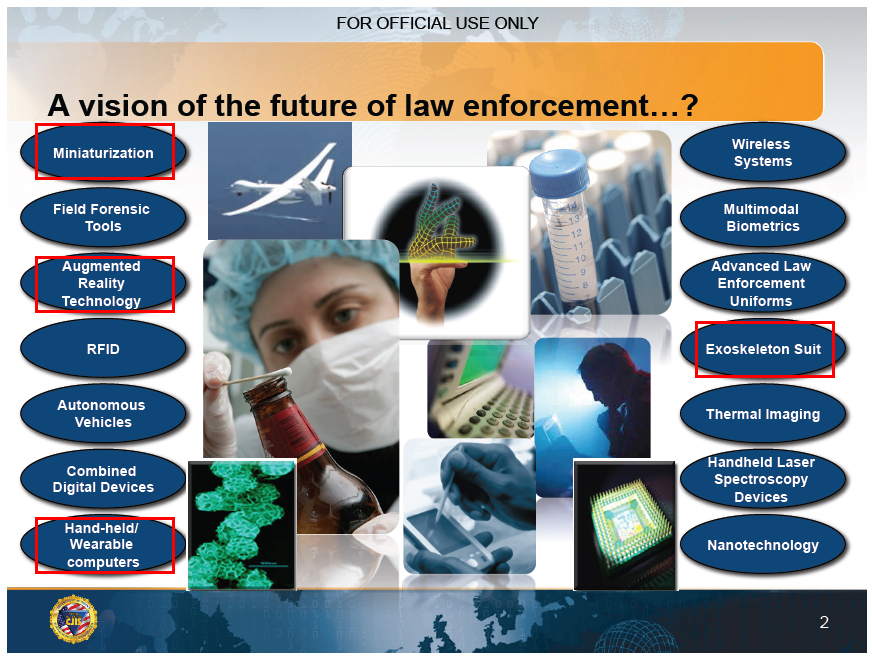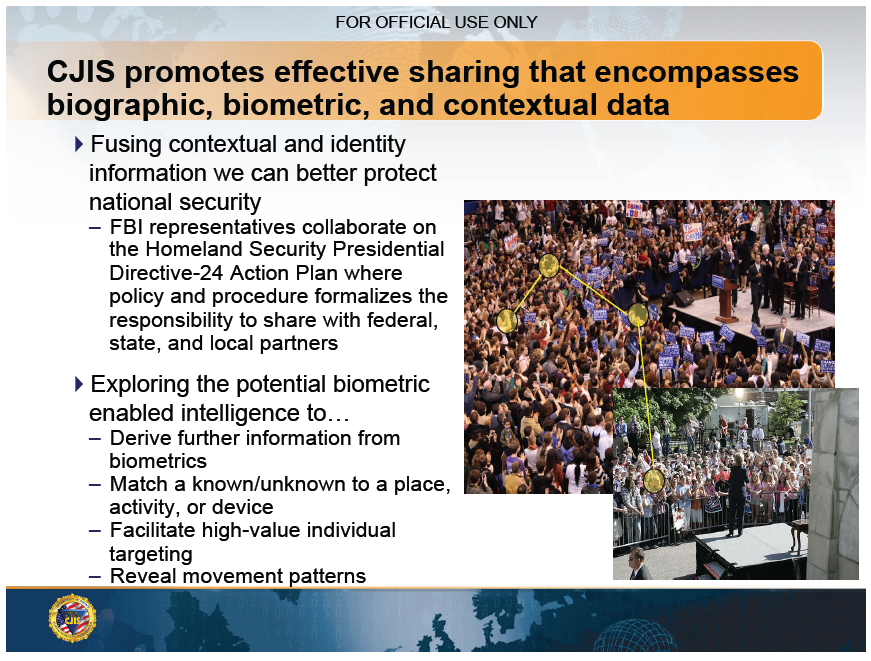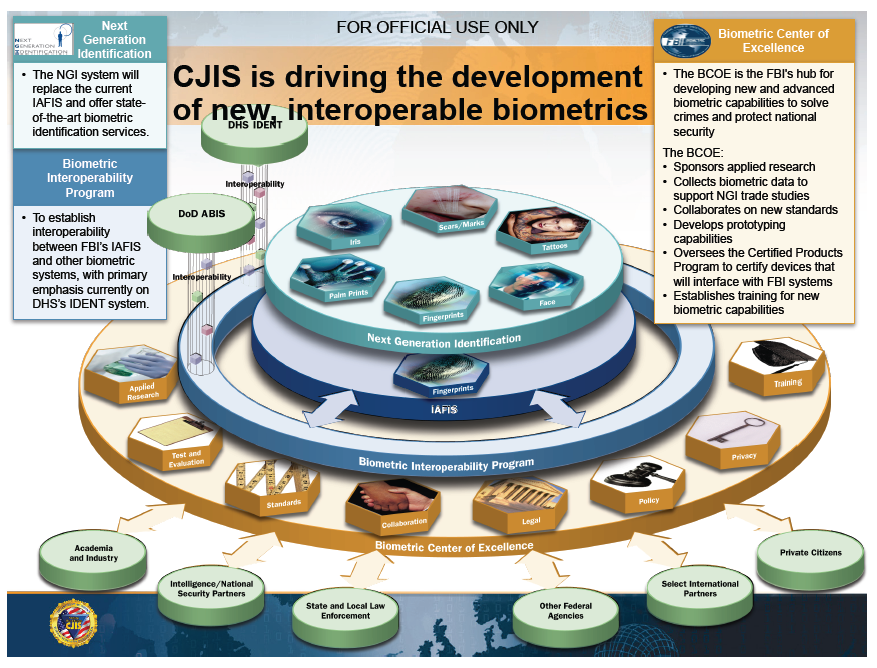- (U//FOUO) FBI CJIS Future Trends in Law Enforcement Brief
- The Scariest Unemployment Graph I’ve Seen Yet
- Is Taxation Theft in One Page or Less
- Who Are the Real Terrorists?
- More Afghan Docs Coming…..
- Goldman Saches Reveals Where Bailout Cash (My Money) Went — Overseas Banks!
- Video: Ron Paul at Financial Services Hearing to Ben Bernanke and Alan Meltzer
- Law Enforcement Spying Guide 2009 Edition
- HUGE NEWS: WikiLeaks Releasing Over 90,000 Documents In ‘Afghan War Diary’
|
(U//FOUO) FBI CJIS Future Trends in Law Enforcement Brief Posted: 26 Jul 2010 04:34 PM PDT From Operation Defuse SEARCH Anniversary: The Next 40 years
Related posts:
|
||
|
The Scariest Unemployment Graph I’ve Seen Yet Posted: 26 Jul 2010 11:33 AM PDT From The Atlantic
The median duration of unemployment is higher today than any time in the last 50 years. That’s an understatement. It is more than twice as high today than any time in the last 50 years. Related posts:
|
||
|
Is Taxation Theft in One Page or Less Posted: 26 Jul 2010 09:01 AM PDT Exclusive to RTR My theory on rights is that they all derive from self-ownership, or that I own my life. Any good or service I voluntarily purchase without violating the rights of others (that equally derive from self-ownership) can now be considered my property based on the fact that I own myself and it was myself that voluntarily decided to purchase that good or service. Now, before answering the question, it’s important to first define the 2 keywords being used: Taxation: The governments ability to claim ownership of another persons property using force or coercion. Theft: An individual not associated with the government that claims ownership of another persons property using force or coercion. The only real difference in the definitions is one act is being carried out by an individual or individuals that are members of this thing we call government and the other act is being carried out by an individual or individuals that aren’t a member of of this thing we call government. To understand the difference we need to understand what law is and what law is not. Law is a set of rules to uphold all the rights of individuals that are derived from self ownership. Government doesn’t operate under the rule of law, it operates under the rule of force. Any individual or group of individuals that use force to claim ownership of another persons property are not obeying true law and are absolutely committing an act of theft no matter what they might label themselves as. Related posts:
|
||
|
Posted: 26 Jul 2010 08:07 AM PDT From Strike The Root By Per Bylund What is fascinating in this day and age is how the definition of previously well-known concepts mysteriously have changed. I’m not thinking of e.g. the word “defense,” which nowadays seems to have a much broader meaning and includes waging wars, occupying foreign nations, and having permanent military bases in almost 200 foreign countries. Not long ago these things would fit squarely in definitions of offense or aggression – but not anymore. Whereas I’m not talking about the definition of “defense,” the topic for this article is necessarily and closely related to it. Consider the case of Bradley Manning. In case you have not heard of him, this is the 22-year-old former Army intelligence analyst who leaked the “Collateral Murder” video, in which a US helicopter crew brutally slaughtered a group of Iraqi civilians believed to be insurgents, among them two Reuters journalists (clearly seen carrying their camera equipment). After being practically an idiot and bragging online about leaking the video and other documents through the WikiLeaks web site, Manning was identified by Army security, subsequently arrested, and is now facing 52 years in prison. Now, I’m not talking about the contractual issue here – it is quite legit for an employer to require that employees do not reveal sensitive information about the business. But the case of Manning is special in so many ways: the employer is not a market actor, the labor services offered by employees are criminal according to any set of laws or morals were they committed without wearing the uniform, and the actions revealed were utterly immoral, possibly illegal (even by state standards!), and took place in occupied territory. The war fought in Iraq is supposedly a “just war” supported in part by the moral argument that one should get rid of dictatorial leaders (unless they are American) and replace them with democracy/freedom (the politically correct dyad), and in part to enforce UN resolutions and get rid of the non-existent weapons of mass destruction (WMDs). One would expect that a just war is not only just in its purpose but also in its implementation. In other words, the horrible deeds revealed to the public by Manning should not be tolerated. So from the same perspective used to legitimize this war, Manning did a good thing – and is being punished. In fact, if the war is truly fought to save a people from their dictator or save the world from a dictator with WMDs, then it would make sense to keep the war machine as transparent and open as democracies – the ideal – supposedly are. After all, the very object of the war is to relieve the world of an oppressive regime for the sake of freedom, democracy, and all that is valuable to man (but I repeat myself, since “democracy” is usually used in the politically correct discourse to denote all that is of value). Then it doesn’t make sense to organize the war machine according to the same principle as the dictatorship one tries to get rid of. It certainly doesn’t make sense to punish anyone blowing the whistle on things not being right. Obviously, any well-meaning democracy would want its defensive forces to behave democratically (whatever that means) and not use undemocratic methods. If undemocratic methods are used, it would be in the interest of the country’s leaders and the people, who theoretically have the true power, to find out and do something about it. Yet it seems in the case of Manning, nobody is happy about his very democratic, moral actions. No, he is regarded as an enemy, a traitor, and terrorist. Despite our high ideals of democracy, freedom, and equal rights, this man is persecuted and prosecuted as a simple criminal – for acting according to some of the most fundamental of these ideals. This should tell us something about the state of things in our modern society. Not only are there different rules for different people, especially as pertains to a people and its leaders, respectively, but words have different meaning. A member of the ruling class who lies to the world is but doing his country a favor, protecting our liberties, and making a sacrifice for our national security. If you do the same, you will be thrown in jail for perjury or fraud. When a member of the ruling class decides to steal other people’s money to finance a campaign of rape and murder in foreign lands, he is protecting us from terrorism. If you do the same, you will be thrown in jail or even put to death as a simple thief, rapist, and murderer. Of course, there is a way around this: If you act in the name of the ruling class, wear their costumes, and blindly obey their slightest whim, then you are free from guilt. Manning, it seems, was not able to see the difference, and for this, he was mercilessly and without warning demoted to citizen. He should have learned that words have different meaning depending on who you are and who you work for, and that different acts mean different things: a murder is not a murder if you’re wearing a uniform. According to this logic, and Manning’s citizen status, he should be punished as the terrorist he is. After all, if he is not a terrorist – who is? Related posts:
|
||
|
Posted: 26 Jul 2010 07:46 AM PDT I just heard from a VERY reliable source that the documents posted by WikiLeaks are just the beginning– or as he said, “the tip of the iceberg.” Stay tuned.. Related posts:
|
||
|
Goldman Saches Reveals Where Bailout Cash (My Money) Went — Overseas Banks! Posted: 26 Jul 2010 07:38 AM PDT From USA Today Goldman Sachs sent $4.3 billion in federal tax money to 32 entities, including many overseas banks, hedge funds and pensions, according to information made public Friday night. Goldman Sachs disclosed the list of companies to the Senate Finance Committee after a threat of subpoena from Sen. Chuck Grassley, R-Ia. Asked the significance of the list, Grassley said, “I hope it’s as simple as taxpayers deserve to know what happened to their money.” He added, “We thought originally we were bailing out AIG. Then later on … we learned that the money flowed through AIG to a few big banks, and now we know that the money went from these few big banks to dozens of financial institutions all around the world.” Grassley said he was reserving judgment on the appropriateness of U.S. taxpayer money ending up overseas until he learns more about the 32 entities. Goldman Sachs (GS) received $5.55 billion from the government in fall of 2008 as payment for then-worthless securities it held in AIG. Goldman had already hedged its risk that the securities would go bad. It had entered into agreements to spread the risk with the 32 entities named in Friday’s report. Overall, Goldman Sachs received a $12.9 billion payout from the government’s bailout of AIG, which was at one time the world’s largest insurance company. Goldman Sachs also revealed to the Senate Finance Committee that it would have received $2.3 billion if AIG had gone under. Other large financial institutions, such as Citibank, JPMorgan Chase and Morgan Stanley, sold Goldman Sachs protection in the case of AIG’s collapse. Those institutions did not have to pay Goldman Sachs after the government stepped in with tax money. Shouldn’t Goldman Sachs be expected to collect from those institutions “before they collect the taxpayers’ dollars?” Grassley asked. “It’s a little bit like a farmer, if you got crop insurance, you shouldn’t be getting disaster aid.” Goldman had not disclosed the names of the counterparties it paid in late 2008 until Friday, despite repeated requests from Elizabeth Warren, chairwoman of the Congressional Oversight Panel. “I think we didn’t get the information because they consider it very embarrassing,” Grassley said, “and they ought to consider it very embarrassing.” The initial $85 billion to bail out AIG was supplemented by an additional $49.1 billion from the Troubled Asset Relief Program, known as TARP, as well as additional funds from the Federal Reserve. AIG’s debt to U.S. taxpayers totals $133.3 billion outstanding. “The only thing I can tell you is that people have the right to know, and the Fed and the public’s business ought to be more public,” Grassley said. The list of companies receiving money includes a few familiar foreign banks, such as the Royal Bank of Scotland and Barclays. DZ AG Deutsche Zantrake Genossenschaftz Bank, a German cooperative banking group, received $1.2 billion, more than a quarter of the money Goldman paid out. Warren, in testimony Wednesday, said that the rescue of AIG “distorted the marketplace by turning AIG’s risky bets into fully guaranteed transactions. Instead of forcing AIG and its counterparties to bear the costs of the company’s failure, the government shifted those costs in full onto taxpayers.” Grassley stressed the importance of transparency in the marketplace, as well as in the government’s actions. “Just like the government, markets need more transparency, and consequently this is some of that transparency because we’ve got to rebuild confidence to make the markets work properly,” Grassley said. AIG received the bailout of $85 billion at the discretion of the Federal Reserve Bank of New York, which was led at the time by Timothy Geithner. He now is U.S. treasury secretary. “I think it proves that he knew a lot more at the time than he told,” Grassley said. “And he surely knew where this money was going to go. If he didn’t, he should have known before they let the money out of their bank up there.” An attempt to reach Geithner Friday night through the White House public information office was unsuccessful. Grassley has for years pushed to give the Government Accountability Office more oversight of the Federal Reserve. U.S. Rep. Bruce Braley, a Waterloo Democrat, said he would propose that the House subcommittee on oversight and investigations convene hearings on the need for more Federal Reserve oversight. Braley is a member of the subcommittee. Braley said of Geithner, “I would assume he would be someone we would want to hear from because he would have firsthand knowledge.” Braley also noted that the AIG bailout was negotiated under President George W. Bush, a Republican. He said he was confident that the financial regulatory reform bill signed by President Obama this week would help provide better oversight than the AIG bailout included. “There was no regulatory framework in place,” Braley said. “We had to put something in place to begin reining them in. I’m confident they will begin to be able to do that.” Related posts:
|
||
|
Video: Ron Paul at Financial Services Hearing to Ben Bernanke and Alan Meltzer Posted: 25 Jul 2010 08:51 PM PDT From July 22, 2010 Part 1 Part 2 Related posts:
|
||
|
Law Enforcement Spying Guide 2009 Edition Posted: 25 Jul 2010 08:45 PM PDT |
||
|
HUGE NEWS: WikiLeaks Releasing Over 90,000 Documents In ‘Afghan War Diary’ Posted: 25 Jul 2010 07:01 PM PDT It’s a good thing the government doesn’t have the Internet “kill switch” in place yet. From the little I’ve read so far, these documents remind me how I felt the first time I read “The Pentagon Papers.” — From The Huffington Post SEE BELOW FOR UPDATES ON “AFGHAN WAR DIARY” AND JOHN KERRY’S STATEMENT. – WikiLeaks has obtained a massive set of records about the Afghanistan war, dubbed “The War Logs,” that paints a grim picture of the nation’s longest military engagement. The Guardian, one of three news organizations with an advanced look at the documents, summarizes:
National Security Advisor James Jones issued a statement indicating that the release may have caught the administration off guard because WikiLeaks did not contact the government in advance. “The United States government learned from news organizations that these documents would be posted,” Jones said while condemning the “irresponsible leaks.” His statement paid special attention to the relationship between the U.S. and Pakistan, which has allegedly been allowing its spy agency to aid the insurgency. The Defense Department declined a CNN request for comment and did not immediately verify the authenticity of the documents because they had not reviewed them yet, another indication that the Pentagon was unprepared for the release. The Guardian’s complete version of The War Logs is available here. The New York Times has created a detailed summary of the documents and provided an explanation on how they pieced the reports together and decided what to publish. – *** UPDATE, 7:55PM ET*** WikiLeaks is releasing their full “Afghan War Diary” on a dedicated website. – ***UPDATE, 9:30PM ET*** John Kerry (D-MA), Chairman of the Senate Foreign Relations Committee, released the following statement:
– FULL STATEMENT FROM JAMES JONES:
Related posts:
|




